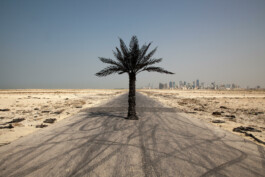Wouter Osterholt studied at Gerrit Rietveld Academie, where his Bachelor in Fine Art was attained in 2001.

Discipline
not specified

Wouter Osterholt is site- and context specific and manifests itself along the faultlines and breaking points of our (political) landscape where social injustice, conflicts or problems come to light. He often uses the method of recontextualization of existing material, such as buildings, monuments, sculptures, rituals or archival material. These reappropriations or reconstructions are a way to question and problematize the focus on exclusivity within our capitalist society and to declare them as part of a larger public discussion in which individuals are challenged to express their personal relationship to the political. His goal is to bring politics back in the public sphere and test the (im)possibilities of alternative ideas which question the existing hegemony. He wants to test the boundaries and presuppositions, which form the fundament of our accepted political reality in order to challenge the paralyzing idea of liberal capitalist democracy as the only political ideal. The work seeks to exceed the parameters of public dialogue and politics by entering the realm of imagination, unexpressed thoughts and dreams.
Year of participation
2021
For the project Nieuwe Uitzichten, we (Deep Time Agency - Wouter Osterholt & Miriam Sentler) want to focus on the relationship between the river, the local community and the industrial heritage of Tegelen (Venlo). Traditionally, large-scale ceramic factories produced tiles and bricks from clay that was mined from the local clay pits. The industry provided wealth and progress to the city and over time it became a vital part of local culture. However, there is a darker side to its success; the industrial ovens in the clay factories consumed a lot of energy, releasing considerable amounts of carbon dioxide. The climate crisis now increasingly affects our lives, as seen in the recent flooding in the area. Taking the future forecast of more flooding and natural disasters in the area due to climate change into account, in which many buildings, historical monuments and sites will eventually be taken ‘back’ by the water, we would like to bring an anthropogenic sacrifice to the river, an ancient tradition practiced by the early inhabitants of the river area. River offerings restored the relationship with the Gods since ancient times, taking into account a balance between the local community and the natural spirits. By bringing a sacrifice to the river, we aim to return something to the natural entity which has been damaged by centuries of industrial practice, treated as an excavation site by the local community.
Website

Wouter Osterholt studied at Gerrit Rietveld Academie, where his Bachelor in Fine Art was attained in 2001.

Discipline
keine Angabe
Wouter Osterholt is site- and context specific and manifests itself along the faultlines and breaking points of our (political) landscape where social injustice, conflicts or problems come to light. He often uses the method of recontextualization of existing material, such as buildings, monuments, sculptures, rituals or archival material. These reappropriations or reconstructions are a way to question and problematize the focus on exclusivity within our capitalist society and to declare them as part of a larger public discussion in which individuals are challenged to express their personal relationship to the political. His goal is to bring politics back in the public sphere and test the (im)possibilities of alternative ideas which question the existing hegemony. He wants to test the boundaries and presuppositions, which form the fundament of our accepted political reality in order to challenge the paralyzing idea of liberal capitalist democracy as the only political ideal. The work seeks to exceed the parameters of public dialogue and politics by entering the realm of imagination, unexpressed thoughts and dreams.
Year of participation
2021
For the project Nieuwe Uitzichten, we (Deep Time Agency - Wouter Osterholt & Miriam Sentler) want to focus on the relationship between the river, the local community and the industrial heritage of Tegelen (Venlo). Traditionally, large-scale ceramic factories produced tiles and bricks from clay that was mined from the local clay pits. The industry provided wealth and progress to the city and over time it became a vital part of local culture. However, there is a darker side to its success; the industrial ovens in the clay factories consumed a lot of energy, releasing considerable amounts of carbon dioxide. The climate crisis now increasingly affects our lives, as seen in the recent flooding in the area. Taking the future forecast of more flooding and natural disasters in the area due to climate change into account, in which many buildings, historical monuments and sites will eventually be taken ‘back’ by the water, we would like to bring an anthropogenic sacrifice to the river, an ancient tradition practiced by the early inhabitants of the river area. River offerings restored the relationship with the Gods since ancient times, taking into account a balance between the local community and the natural spirits. By bringing a sacrifice to the river, we aim to return something to the natural entity which has been damaged by centuries of industrial practice, treated as an excavation site by the local community.